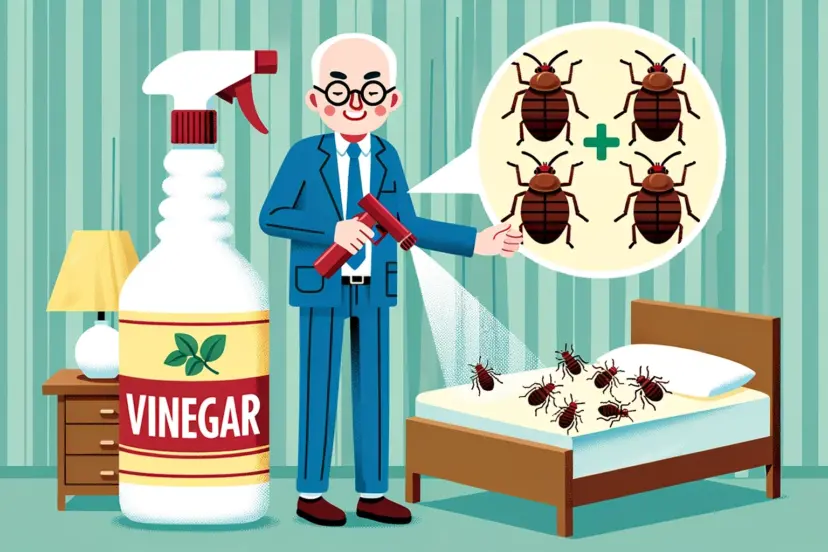Does Vinegar Kill Bed Bugs?
Bedbugs are tiny, bloodthirsty insects that have mastered the art of stealth. They are known for their elusive behaviour, hiding in hard-to-reach places during the day and crawling out at night to feed on human blood. Although painless at the time of the bite, they can cause skin irritation, redness and severe itching. The real fear of bedbugs lies in the psychological distress they cause, as people lose sleep at the mere thought of bedbugs feasting on them at night. Does Vinegar Kill
The Bed Bug Menace
Bed bugs, small blood-sucking insects, have plagued humans for centuries, causing severe itching and discomfort. The idea of them crawling in your bed and feeding on your blood during sleep is unnerving. Besides their bites, their ability to hide, multiply rapidly, and resist common chemical treatments makes them a challenging pest to eradicate. This situation can lead to anxiety, sleeplessness, and social embarrassment. The high cost of professional extermination and the stigma around infestations often push individuals towards discreet home-based solutions. Even though they can infest any part of the home, you’ll find them most commonly in beds. They spread quickly and resist many common pest control methods, presenting a significant menace for homeowners.
Home Remedies: A Brief Overview
Numerous online home remedies claim to eliminate
These remedies often lack scientific backing, and results can vary due to different infestation levels among other factors. While they offer a sense of proactive action, in severe infestations, they might waste time and resources. It’s crucial to approach with skepticism and consider professional pest control for persistent or severe bed bug issues.
- Kills Bed Bugs and Bed Bug Eggs
- Kills Fleas and Dust Mites
- Non-staining, Leaves No Odor
Understanding Vinegar
Vinegar, known for its acetic acid content, is used for various household purposes including minor pest control. It’s thought that its acidity may deter pests like
Types of Vinegar
Various types of vinegar exist in the market, each boasting its unique composition and uses. Common types include white vinegar, apple cider vinegar, balsamic vinegar, and malt vinegar, among others. People often recommend white vinegar for attempting to control pests like
On the other hand, people don’t typically recommend other types of vinegar such as apple cider vinegar for this purpose due to their lower acidity and different compositions. It’s crucial to note that while different types of vinegar serve various purposes in cooking and cleaning, no scientific proof backs their effectiveness against

Common Uses of Vinegar
Vinegar is a versatile product with a wide range of uses. It’s a popular cleaning agent, known for its ability to cut through grease and disinfect surfaces. Besides cleaning, vinegar is also a common ingredient in cooking, used for its ability to add flavor and act as a preservative. Its antimicrobial properties make it a popular choice for cleaning and disinfecting in households. Furthermore, vinegar is often suggested as a home remedy for various minor ailments, like soothing a sore throat or aiding in digestion.
In the realm of home remedies, vinegar has been suggested for everything from treating mild burns to repelling insects. Its accessibility and the belief in its natural remedial properties make it a staple in many households. However, while vinegar is undoubtedly useful in many scenarios, its efficacy in dealing with bed bug infestations remains largely unproven and unreliable. Hence, while vinegar is a household staple with numerous beneficial uses, relying on it to resolve a bed bug infestation is not advisable.
- 100% Kill Efficacy Bedbugs, Mites, Eggs
- Lasting Protection
- USDA BIO-certified
- Plant Extract Based & Non-Toxic
- Child & Pet Safe
Vinegar as a Bed Bug Remedy
White vinegar is considered for bed bug control due to its acetic acid content, which when sprayed undiluted, might deter
Historical Usage
The use of vinegar as a pest control remedy originates from traditional practices during times when chemical solutions were either scarce or expensive. People used it for minor pest problems, and its use against
However, there isn’t much documentation on vinegar’s historical use against
The Science Behind Vinegar’s Effect on Bed Bugs
The notion of using vinegar against
However, scant scientific evidence backs the effectiveness of vinegar against
- Bedbug Detection and Protection
- Effective, Heav Duty, Versatile Design
- Use under bed posts and furniture legs
- Bed bugs climb in but cannot climb out
The Effectiveness of Vinegar
The effectiveness of vinegar in controlling
Moreover, the effectiveness of vinegar is further limited as it only works upon direct contact, and its effects are temporary. Even if vinegar does irritate or kill some
Does Vinegar Kill Bed Bugs ?
The straightforward answer is, not effectively. While vinegar might kill some
Furthermore, the claim that vinegar can eradicate
Will Vinegar Kill Bed Bug Eggs?
The effectiveness of vinegar against bed bug eggs is even more dubious. A sticky substance protects bed bug eggs, adhering them to surfaces. The acetic acid in vinegar lacks the potency to breach this protective layer and destroy the eggs.
Furthermore, bed bug eggs often hide in cracks, crevices, and hard-to-reach places, making a simple vinegar spray nearly useless in reaching them. Without tackling the eggs, any attempt to control an infestation falls flat as new
You might be interested in: Where Do Bed Bugs Hide?
Does White Vinegar Kill Bed Bugs ?
White vinegar, with higher acetic acid content, is often cited as effective against
While it might kill some bugs on contact, it doesn’t address hidden bugs and eggs. The unpleasant smell and need for repeated applications make it a subpar solution. Relying solely on white vinegar can worsen the infestation, providing a false sense of control as

How to Use Vinegar Against Bed Bugs
Preparing the Vinegar Solution
- Choose the Right Vinegar: For this purpose, white vinegar is often recommended due to its high acidity.
Ensure that the vinegar you choose has a high concentration of acetic acid, which is believed to be the active ingredient that could affectbed bugs . - Purchase Quantity: Depending on the size of the area you plan to treat, purchase an adequate amount of vinegar. It’s better to have more than you think you’ll need to ensure thorough coverage.
- Gather Necessary Supplies: You will need a spray bottle to make the application of vinegar easier and more controlled. If you don’t have a spray bottle, any container that allows for easy application can work, though a spray bottle is preferable for targeting specific areas.
- Prepare the Area: Before you fill your spray bottle with vinegar, prepare the area by removing any clutter. Identify the main areas where
bed bugs have been spotted or are likely to hide such as mattresses, bed frames, and crevices. - Fill the Spray Bottle: Fill your spray bottle with undiluted white vinegar. Ensure the spray bottle is clean and free from any other chemicals or residues to maintain the vinegar’s potency.
- Test a Small Area: Before going all out, it’s wise to test a small, inconspicuous area with the vinegar to ensure it won’t cause any discoloration or damage, especially on delicate fabrics or surfaces.
- Ready for Application: With your vinegar solution prepared and the area ready, you can now proceed to the application stage.
- 100% Kill Efficacy Bedbugs, Mites, Eggs
- Lasting Protection
- USDA BIO-certified
- Plant Extract Based & Non-Toxic
- Child & Pet Safe
Application on Bed Bugs
The application process involves spraying the vinegar directly onto visible
It’s vital to note that vinegar may only kill bed bugs upon direct contact, and given the elusive nature of
The Limitations of Using Vinegar
Using vinegar is merely a short-term relief to a bed bug problem. It doesn’t eliminate eggs or bugs that might be well-hidden. Additionally, the strong smell can be unpleasant and may even irritate individuals with respiratory issues. Also, the need for direct contact to kill
Short-term Effect
The biggest limitation of using vinegar to treat
Moreover, the evaporation rate of vinegar is high, meaning its effect diminishes rapidly over time. This short-lived action against
Strong Smell
The strong smell of vinegar is a major drawback for its use against
When sprayed, the vinegar odor spreads quickly, creating an uncomfortable living environment. It can be embarrassing, especially with guests around, and repeated applications only exacerbate this issue. This strong smell can also irritate individuals with respiratory issues or allergies, making it a risky choice for some households.
Moreover, the odor requires frequent applications to maintain any potential effectiveness against
Safety Considerations
While vinegar is a common household item and generally safe, it can cause issues. The strong smell can be irritating to some individuals, especially those with respiratory issues. Additionally, vinegar’s acidity can damage certain materials. Spraying vinegar on delicate fabrics, wooden surfaces, or metal can lead to discoloration and damage. Hence, while it seems like a safe and natural solution, it does come with its set of drawbacks that need careful consideration.
Alternative Solutions to Bed Bugs
Given the limitations of vinegar, it’s prudent to explore other more effective solutions. Professional pest control services remain the most reliable solution for bed bug infestations. They possess the right tools and pesticides capable of eliminating
Professional Pest Control
Professional pest control services are the most effective solution to bed bug infestations. They have the knowledge, experience, and chemicals that can eliminate
Moreover, professional pest control experts can identify the extent of the infestation and devise a tailored plan to eradicate
Other Home Remedies
Besides vinegar, people claim other home remedies to have some level of effectiveness against
- Kills Bed Bugs and Fleas
- Inhibits Reinfestation Up to 7 Months
- Use indoors in enclosed spaces
- Non Toxic
Weighing the Pros and Cons
When considering using vinegar for
You might be interested in: What Chemical Kills Bed Bugs and Their Eggs?
Frequently Asked Questions
Can Vinegar Kill
Vinegar may kill some
How to Mix Vinegar to Kill
Use white vinegar undiluted in a spray bottle and spray directly on
Does Vinegar in Laundry Kill
Adding vinegar to laundry may not effectively kill
Does Apple Cider Vinegar Kill
Apple cider vinegar has not been proven to be effective against
What Kind of Vinegar Kills
White vinegar is often recommended due to its higher acidity, but it’s not a proven solution.









